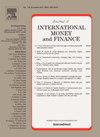The exchange rate elasticity of the Swiss current account
IF 2.8
2区 经济学
Q2 BUSINESS, FINANCE
引用次数: 0
Abstract
This paper investigates the effects of Switzerland’s real effective exchange rate (REER) on its current account. Using dynamic empirical methods, we focus on exchange rate movements that are unrelated to real and monetary developments, i.e., those more likely to be driven by the Swiss franc’s safe-haven proprieties or unexpected exchange rate policy decisions. The paper’s key result is that the Swiss headline current account has been largely inelastic to the exchange rate at the business cycle frequency. Three factors explain this somewhat counterintuitive result. A) A negative but short-lived effect on the trade balance is partly offset by a positive effect on net investment income. B) Large and often volatile net exports of nonmonetary gold blur the aggregate reaction. C) Improved terms-of-trade largely offset the negative effect on the (real) goods trade balance, as import prices tend to fall by more than export prices. The limited sensitivity of the current account, however, does not mean that the Swiss economy is insensitive to the exchange rate. Our results confirm that consumer prices, as well as corporate profits in particularly exposed sectors, decline significantly following an appreciation. These results suggest that an appreciation of the Swiss franc likely doesn’t reduce Switzerland’s current account quickly but rather tightens monetary conditions, reduces GDP, and hampers prospects in the longer term.
瑞士经常账户的汇率弹性
本文研究了瑞士实际有效汇率(REER)对其经常账户的影响。使用动态实证方法,我们关注与实际和货币发展无关的汇率变动,即那些更有可能由瑞士法郎的避险特性或意外的汇率政策决定驱动的汇率变动。这篇论文的关键结论是,在商业周期频率上,瑞士总体经常账户对汇率基本上没有弹性。有三个因素可以解释这个有点违反直觉的结果。A)对贸易平衡的负面但短暂的影响部分地被对净投资收入的正面影响所抵消。B)大量且经常波动的非货币性黄金净出口模糊了总体反应。C)贸易条件的改善在很大程度上抵消了对(实际)商品贸易平衡的负面影响,因为进口价格往往比出口价格下降得更多。然而,经常账户的有限敏感性并不意味着瑞士经济对汇率不敏感。我们的研究结果证实,在人民币升值后,消费者价格以及特别受影响的行业的企业利润都会大幅下降。这些结果表明,瑞士法郎的升值可能不会迅速减少瑞士的经常账户,而是会收紧货币状况,降低GDP,并阻碍长期前景。
本文章由计算机程序翻译,如有差异,请以英文原文为准。
求助全文
约1分钟内获得全文
求助全文
来源期刊

Journal of International Money and Finance
BUSINESS, FINANCE-
CiteScore
4.20
自引率
4.00%
发文量
141
期刊介绍:
Since its launch in 1982, Journal of International Money and Finance has built up a solid reputation as a high quality scholarly journal devoted to theoretical and empirical research in the fields of international monetary economics, international finance, and the rapidly developing overlap area between the two. Researchers in these areas, and financial market professionals too, pay attention to the articles that the journal publishes. Authors published in the journal are in the forefront of scholarly research on exchange rate behaviour, foreign exchange options, international capital markets, international monetary and fiscal policy, international transmission and related questions.
 求助内容:
求助内容: 应助结果提醒方式:
应助结果提醒方式:


